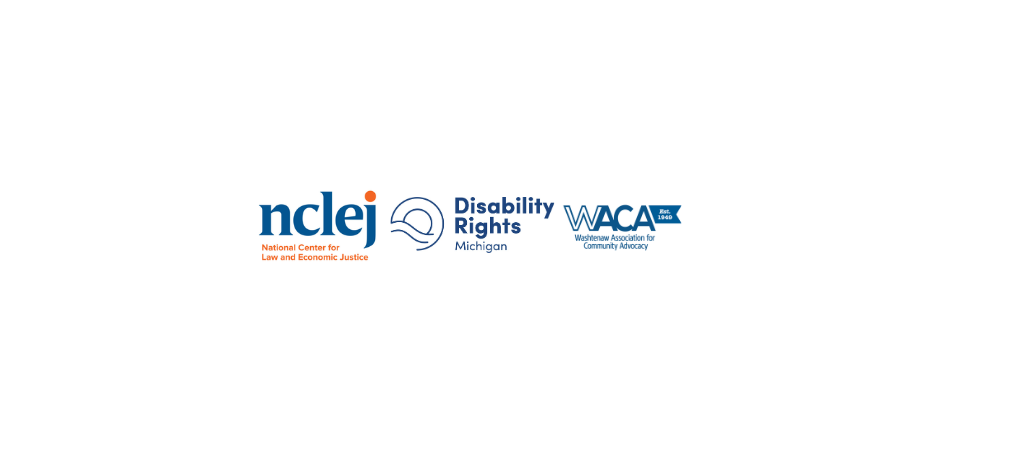DRM > Groups Secure Over $100M in Additional State Expenditures for Michiganders With Developmental Disabilities
Groups Secure Over $100M in Additional State Expenditures for Michiganders With Developmental Disabilities
Lansing, MI – The National Center for Law and Economic Justice and Disability Rights Michigan are pleased to announce a settlement of a federal civil rights action that will, if approved by the Court, secure more than $110 million in additional State expenditures for Michiganders with intellectual and developmental disabilities (I/DD) who rely on Medicaid Community Living Support (CLS) services to live at home and participate in their communities.
Subject to legislative appropriations and various other approvals, the settlement will provide self-determination CLS recipients in Michigan’s Habilitation Supports Waiver a rate of $31/hour, a 35% increase over the current $20.50. Under self-determination (SD), I/DD individuals or their families need not depend on care agencies but can hire their own staff and control their own lives. The SD rate for Overnight Health & Safety Support services (OHSS) will also increase, to 70% of the new CLS rate. Both rates will be adjusted for inflation.
The CLS rate increases represent an additional expenditure of at least $22 million annually, amounting to more than $110 million over the five-year term of the deal. The OHSS increases will add to this total.
If the funding or other contingencies are not met by May 2025, an alternative costing-out procedure will ensure that each SD CLS recipient has a budget that, line by line, is sufficient to support their individual needs. The costing-out procedure will be implemented in any event when the settlement expires in 2029.
“Our lawsuit was about preventing institutionalization and empowering folks living with I/DD to thrive in their communities,” said Edward Krugman, Senior Attorney at the National Center for Law and Economic Justice. “The huge uptick in funding means that Michiganders who need assistance to get out of the house and into the community will be able to hire and retain their support staff by paying these hardworking caregivers something close to what they deserve.”
The case was filed in 2016 and was eventually dismissed by the district court. In November 2020, however, in a major ruling that covered almost every aspect of Medicaid funding for the I/DD community, the U.S. Court of Appeals for the Sixth Circuit reversed the dismissal. The Court extended important legal precedent by ruling that isolation at home and risk of institutionalization constitute violations of the “integration mandate” under the Americans with Disabilities Act, which requires that people with disabilities be provided services in the most integrated setting appropriate to their needs. Both unjustified isolation at home and risk of institutionalization, the Court held, constitute discrimination based on disability.
Said Cindy Waskul, the mother and guardian of Plaintiff Derek Waskul, “This has been a long eight years with lots of ups and downs. The wait is finally over, and now I can look to the future with peace of mind, knowing that finding appropriate staff for Derek will not be difficult because the wage will now fit this challenging job. The increased CLS rate will also allow Derek to participate fully and meaningfully in activities in his community. I’m thrilled that so many in Michigan will benefit from this settlement.”
“We brought this suit to challenge budget cuts that threatened our plaintiffs with institutionalization,” said Nick Gable, Senior Attorney at Disability Rights Michigan. “This settlement will ensure that people with developmental disabilities will be able to afford the services they need to thrive in their communities. This system hopefully will now work as it should.”
Helping to fix the system “is a monumental win for the people ACA serves,” said Kathleen Homan, President and CEO of WACA. “The settlement reinforces that people with I/DD have the right to be fully included in their community and proves that their voices can be heard. I want to thank NCLEJ and DRM for their eight years of hard work and their commitment to people with I/DD. A special thanks to the individual plaintiffs for their strength and courage to stand up for their rights and the rights of the people in Michigan with I/DD.”
The National Center for Law and Economic Justice (NCLEJ) advances racial and economic justice for low-income families, individuals, and communities across the country through ground-breaking impact litigation, policy advocacy, and support for grassroots organizing. Founded in 1965, NCLEJ protects access to critical benefits such as food stamps, Medicaid, and childcare; empowers low-wage workers, advocates for people with disabilities; and fights unlawful debt collection.
Disability Rights Michigan (DRM) is the independent, private, nonprofit, nonpartisan protection and advocacy organization authorized by Federal and State law to advocate for and protect the legal rights of people with disabilities in Michigan.
The Washtenaw Association for Community Advocacy (WACA) was organized by a group of parents in 1949 as one of the first organizations in Michigan to advocate for people with developmental disabilities and their families. The parents sought equal education rights for their children with developmental disabilities living in a state institution. They believed, as WACA does today, that each person, regardless of their disability, has the right to authentic power and control over their life. The parents’ early and ongoing dynamic contributions to the field of disability rights advocacy built the strong foundation for the work ACA has done for 74 years.
